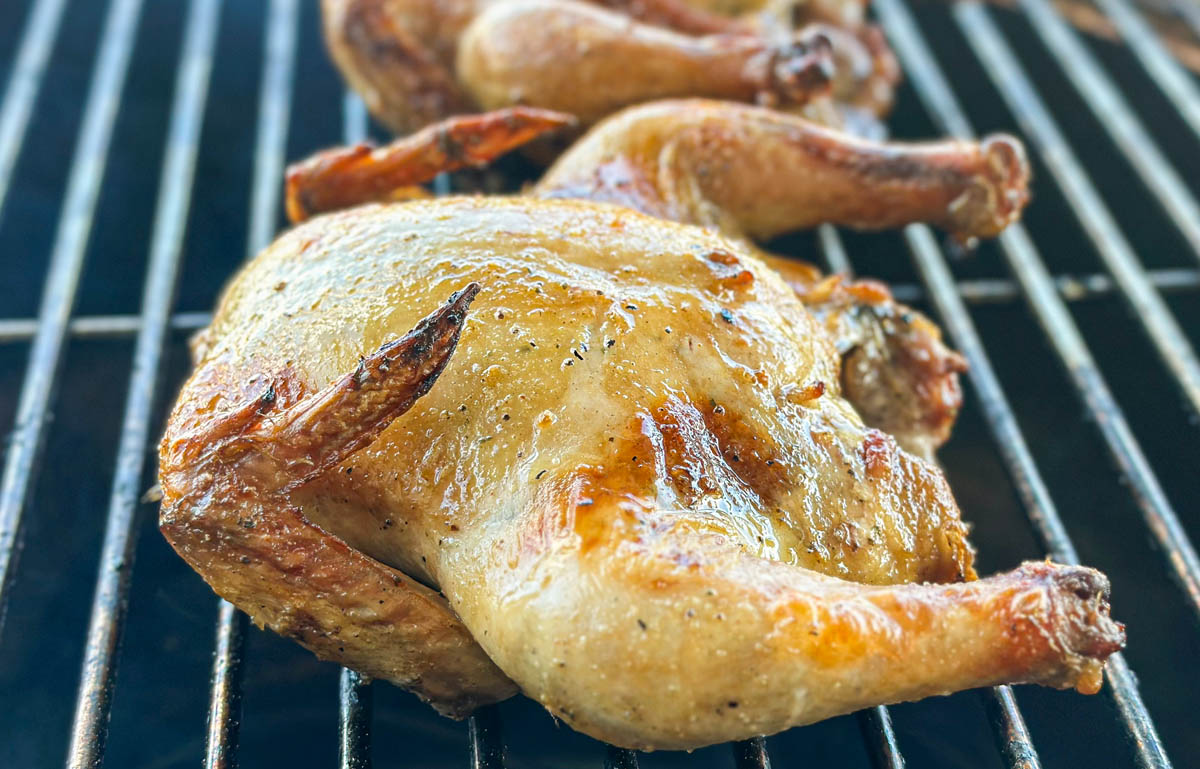How to Thaw a Frozen Turkey: Safe & Fastest Methods

With the big day on the horizon, you’ll want to make sure your turkey is properly thawed and ready to be cooked.
Getting the perfect Thanksgiving centerpiece turkey is all about preparation, and properly thawing out your bird is a massive part of that. After all, no one wants dry overcooked meat or raw sections in their dinner.
We’ll run through how to safely defrost your turkey so that you can get on with making all those delicious Thanksgiving dishes!
What’s the best way to defrost a frozen turkey?
According to the USDA, refrigerator thawing is the safest way to thaw your turkey at a consistently low temperature, helping to prevent bacterial growth. It’s also the easiest of the turkey thawing methods.
- Once you’ve got your frozen turkey home, check the weight. You’re going to need around 24 hours for every 4-5lbs of turkey to make sure it is properly defrosted.
- Give you refrigerator a good wash with soapy water to cut down on possible contact contamination and move the shelves around to make room for your bird.
- An entirely deforested turkey can then sit in your refrigerator for two days before it needs to be cooked.
- To check if your turkey is fully defrosted, make sure the body is soft, the legs can be moved, and that there are no ice crystals in the body cavity.

If your refrigerator is too full (which is quite likely right before Thanksgiving) you can use a cooler or any large food-safe container.
Just make sure you thoroughly clean the container before use and add enough ice to maintain a temperature below 40°F.
The turkey should also be completely submerged.
This can take multiple days depending on the size of the bird (part of the reason we recommend a 10-12lb bird), so some people like to do the defrosting in a chiller with a bag of ice to free up room in the refrigerator.
How long doese it take to defrost a turkey in the fridge?
You’re going to need around 24 hours in the fridge for every 4-5lbs (1.8-2.2kg) of turkey to make sure it is properly defrosted.
So allow 3-4 days for an average size turkey to fully defrost.
To keep your turkey in prime condition, you’ll want to make sure that it remains covered, but not wrapped and is on a plate or platter that can collect any water that comes off it as it defrosts.
That water is full of bacteria and is not something you want slopping around the inside of your fridge.
How to cold water thaw a frozen turkey
If you’re really pressed for time, you can use cold water to thaw a turkey, but there are some crucial things to keep in mind.
Cold water thawing cuts down on your turkey thawing time by about half, but it is a little more labor-intensive.
Cold water thawing step by step:
- Leave your turkey in the wrapping it came in and fully submerge it in cold water in a large container. You can use your sink for this, but make sure to give it a thorough wash beforehand, just to be safe.
- Make sure the water is cold, not at room temperature, to keep the turkey below 40 °F and outside of the “Danger Zone.”
- You’ll need to change the water every 30 minutes or so and add in fresh cold water to make sure the turkey doesn’t rise above 40 °F.
- If you are using cold water thawing, allow about 30 minutes of defrosting time per pound. This means you can get a sizeable 15-pound turkey defrosted in about 8 hours.
- Once thawed, cook your turkey immediately.
Before attempting the cold water thaw method, make sure you have enough space inside your fridge for a turkey-sized load of ice and water without making any other contents dangerously close to freezing themselves or getting a load of raw meat water on your other food.
You can also use a chiller like in the video below.
The other thing to keep in mind is that, from a food safety point of view, this method increases the chance of you getting food poisoning, this is because some of the bird will end up sitting in a temperature range of 40 to 140°F, in which colonies of bacteria can double every 20-minutes.
How to thaw a frozen turkey quickly
Sadly, there are no quick ways to thaw a frozen turkey.
In fact, the only way to thaw a frozen turkey is by using these two methods: cold water and time.
Most other ways for defrosting don’t work for a frozen turkey because of the size of the bird and the amount of time it takes for a full-sized turkey to defrost.
The issue is that using methods like a microwave doesn’t allow the meat to defrost consistently, resulting in some parts of the turkey sitting in the danger zone while others remain frozen.
The longer raw turkey meat sits in the danger zone, the greater the chance that the Thanksgiving gift you give your family this year will be salmonella!
Can you thaw a turkey in the microwave?
We already pointed out the issues with thawing a turkey in the microwave but as a last resort, you can technically thaw your turkey in the microwave.
If you plan to do this, always check the manufacturer’s guidelines for what size of bird your microwave can accommodate.
- Remove all the wrapping from your turkey and place it on a microwave-safe dish in your microwave.
- Using the “defrost by weight” function, which should result in a defrosting time of around 6 minutes per pound.
- Rotate your turkey several times while it is cooking and flip it over at least once.
- If you turkey starts to actually cook during the defrosting process, remove it from the microwave and let it rest for 5 minutes before putting it back in.
Once thawed, cook your turkey immediately.
Can you smoke a frozen turkey?
You might have read that you can grill a frozen steak, or a frozen chicken breast, so you would be excused for thinking it was OK to smoke a frozen turkey.
Unfortuantely, smoking a frozen turkey runs the risk of serious food poisoning.
While the turkey is thawing and cooking on the smoker, large parts of the meat would be in the danger zone where bacteria can quickly multiply.
Safety tips for thawing a turkey
Now that we’ve covered the best ways to thaw out a turkey, here are a few things to avoid. Unless food poisoning and a ruined dishwasher is your idea of a great Thanksgiving gift.
- Do not defrost your turkey at room temperature – This will put your turkey squarely in the middle of the “Danger Zone” of 40°F to 140°F. At this temperature, colonies of bacteria like Salmonella or Campylobacter will multiply every 20 minutes.
- Do not wash your turkey – Washing your turkey will not remove any surface bacteria, all it will do is spread it all over your sink, work surfaces, and you.
- Do not defrost your turkey in your dishwasher – Not only will this not defrost your turkey correctly, but it will also spray bacteria all over your dishwasher.
- When cooking your Thanksgiving dinner, be sure that you cook any meat completely through before serving; 165°F is typically recommended. This should kill all harmful bacteria and pathogens that may be present due to improper cooking or defrosting practices.
- Don’t wash your turkey, not only does it not impact the amount of bacteria on the skin, but it can actually spread that bacteria around your sink, kitchen, and work surfaces.
How to store defrosted turkey in the fridge
A fresh or defrosted turkey can be stored in the refrigerator for about two days before it needs to be cooked.
Prep your fridge beforehand by washing it out with soapy water and making sure there is enough room.
Bear in mind that if you are using the cold water method or microwave to defrost your turkey, you will need to cook it straight away. It cannot be stored safely in the refrigerator.
Always observe the correct turkey thawing times
Leaving your frozen Turkey in the refrigerator is hands down the best way to defrost it, but if you’re in a pinch, using the cold water method works can cut the time down, with a slight increase in the risk of food poisoning.
Our suggestion. Don’t risk poisoning Grandma and plan ahead and thaw your turkey completely in the refrigerator.







